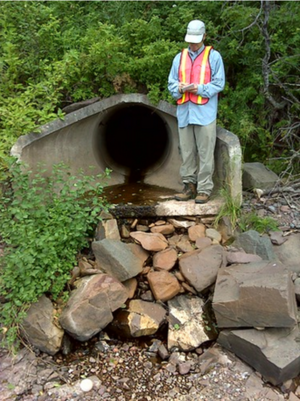Stormwater MS4 Program
Stormwater management is the control of excess water (rain, melting ice and snow) that runs off the land. Runoff increases as land is developed. The establishment of impervious surfaces, such as parking lots, hinders the infiltration of rain water and melted snow into the soil. Stormwater management offsets the impact of land development, flooding and erosion problems and non-point source pollution. Non-point source pollution occurs when runoff picks up contaminants such as debris, oil and petroleum products, pet waste, fertilizers and sediment and carries them into our creeks, streams, rivers and oceans. 
The Clean Water Act (CWA) established the National Pollution Discharge Elimination System (NPDES) Phase II program which requires municipalities with separate storm sewer systems (MS4's) to obtain permits and requires them to implement and enforce a Department of Environmental Protection (DEP) approved stormwater management program to protect water quality. The MS4 program consists of six (6) minimum control measures which are regulated and enforced by the Township to reduce the number of pollutants discharged into our waterways.
To view the Township's watershed map, please click here.
The six (6) minimum control measures implemented and enforced by Middletown Township are outlined below:
1. Public Education and Outreach - Distributing educational materials and performing outreach to inform citizens about the impacts polluted storm water runoff discharges can have on water quality.
2. Public involvement/Participation - Providing opportunities for citizens to participate in program development and implementation, including effectively publicizing public hearings and/or encouraging citizen representatives on a storm water management panel.
3. Illicit Discharge Detection and Elimination - Developing and implementing a plan to detect and eliminate illicit discharges to the storm sewer system (includes developing a system map and informing the community about hazards associated with illegal discharges and improper disposal of waste).
4. Construction Site Runoff Control - Developing, implementing and enforcing an erosion and sediment control program for construction activities that disturb 1 or more acres of land (controls could include silt fences and temporary storm water detention ponds).
5. Post-Construction Runoff Control - Developing, implementing and enforcing a program to address discharges of post-construction storm water runoff from new development and redevelopment areas. Applicable controls could include preventive actions such as protecting sensitive areas (e.g., wetlands) or the use of structural BMP's such as grassed swales or porous pavement.
6. Pollution Prevention/Good Housekeeping - Developing and implementing a program with the goal of preventing or reducing pollutant runoff from municipal operations. The program must include municipal staff training on pollution prevention measures and techniques (regular street sweeping, reduction in the use of pesticides and street salt, responsible vehicle and equipment maintenance procedures).
For more information on the MS4 program, please visit the DEP's web site to get the most updated information on this and other important environmental topics.